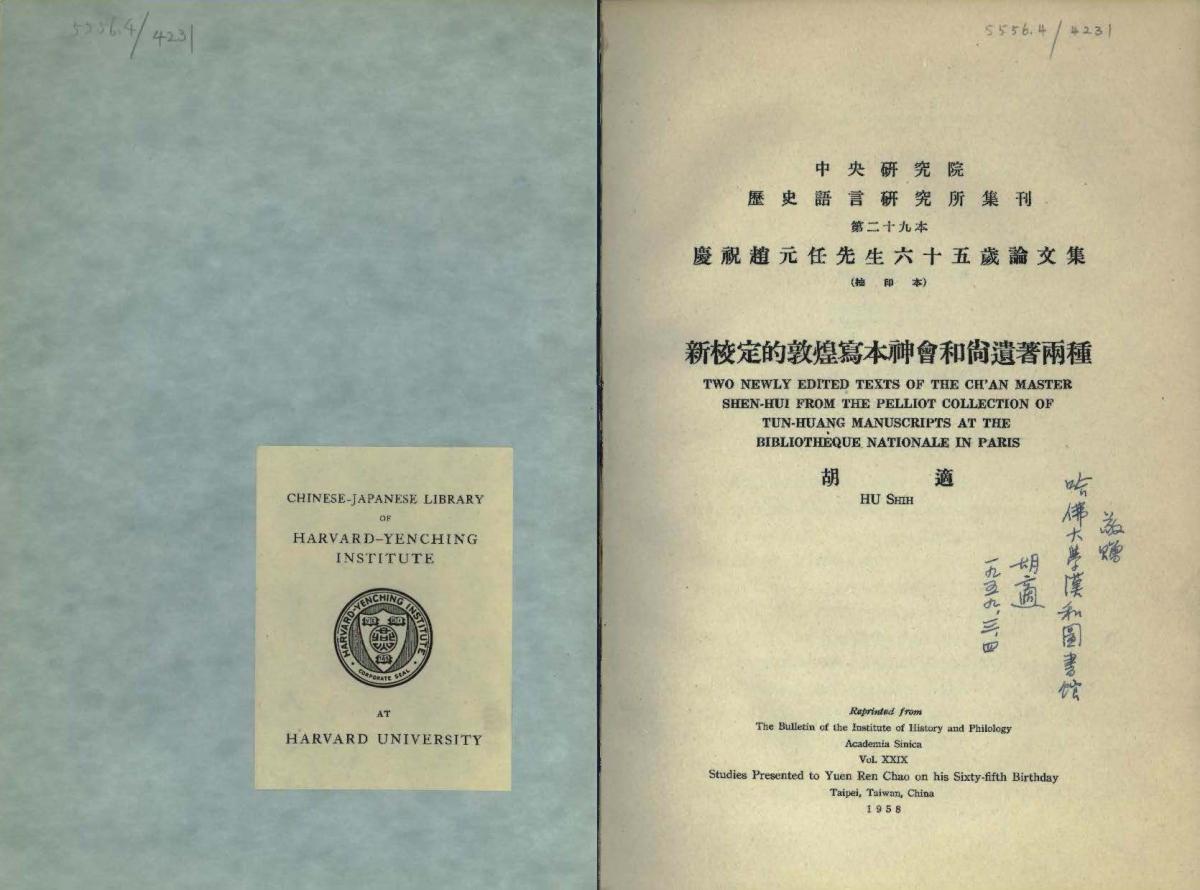HYI FELLOWSHIP RECIPIENT DISCOVERS HARVARD-YENCHING LIBRARY RARE BOOK SIGNED BY HU SHIH
 Yifei Shi, a second-year student in the Regional Studies – East Asia (RSEA) A.M. program at Harvard and a recipient of the HYI-RSEA Fellowship, recently discovered a book in the Harvard-Yenching Library signed by Hu Shih that has now been reclassified as part of the Library’s rare book collection.
Yifei Shi, a second-year student in the Regional Studies – East Asia (RSEA) A.M. program at Harvard and a recipient of the HYI-RSEA Fellowship, recently discovered a book in the Harvard-Yenching Library signed by Hu Shih that has now been reclassified as part of the Library’s rare book collection.
The book, entitled Two Newly Edited Texts of the Chan Master Shen-hui from the Pelliot collection of Tun-huang Manuscripts at the Bibliotheque Nationale in Paris, is one of Hu Shih’s best known scholarly works. As Shi notes, "This book on early Chan (Zen) Buddhism in the Tang dynasty was written around 1926 after comparing Dunhuang manuscripts in Paris, Tokyo, and Beijing. During the writing of the book, Hu Shih also went to New York to consult with D.T. Suzuki, perhaps the most well-known Buddhist scholar in the US at the time. The research process was truly global, and the influence of his work is so far-reaching that the findings and arguments Hu Shih presented still engage scholars in debates today."
Shi discovered the book after requesting it from the library depository for a class taught by Professor James Robson on early Chan (Zen) Buddhism. As she describes, “Since most of the copies were checked out, this was the only one available at the time I checked…When I saw the copy, I was surprised at this thin booklet with a worn-out cover. I opened it, [and] Hu Shih's hand-written words were on the front page: ‘A gift to Harvard Chinese-Japanese Library with respect. Hu Shih March 4, 1959.’ There is a library stamp which reads, ‘The Chinese-Japanese Library of the Harvard-Yenching Institute at Harvard University. Gift of the Author, APR 15 1959’.”
This copy is part of the “Studies Presented to Yuen Ren Chao on his Sixty-fifth Birthday,” edited and reprinted by the Institute of History and Philology, Academia Sinica. Upon her discovery, Shi notes “I told Professor Lu Yang at Peking University about it. In his opinion, this copy has two historical significances. On the one hand, it is a work signed by the author; on the other, this was also a ‘birthday gift’ to another established scholar.”
After first coming across the book, Shi posted a photo of it on Weibo, where it was reposted by Prof. Lu and then seen by Jidong Yang (Head of the East Asia Library at Stanford University), among others. After seeing the post, Dr. Yang reached out to the Harvard-Yenching Library, which will now keep the book in its rare book room.
No comments:
Post a Comment